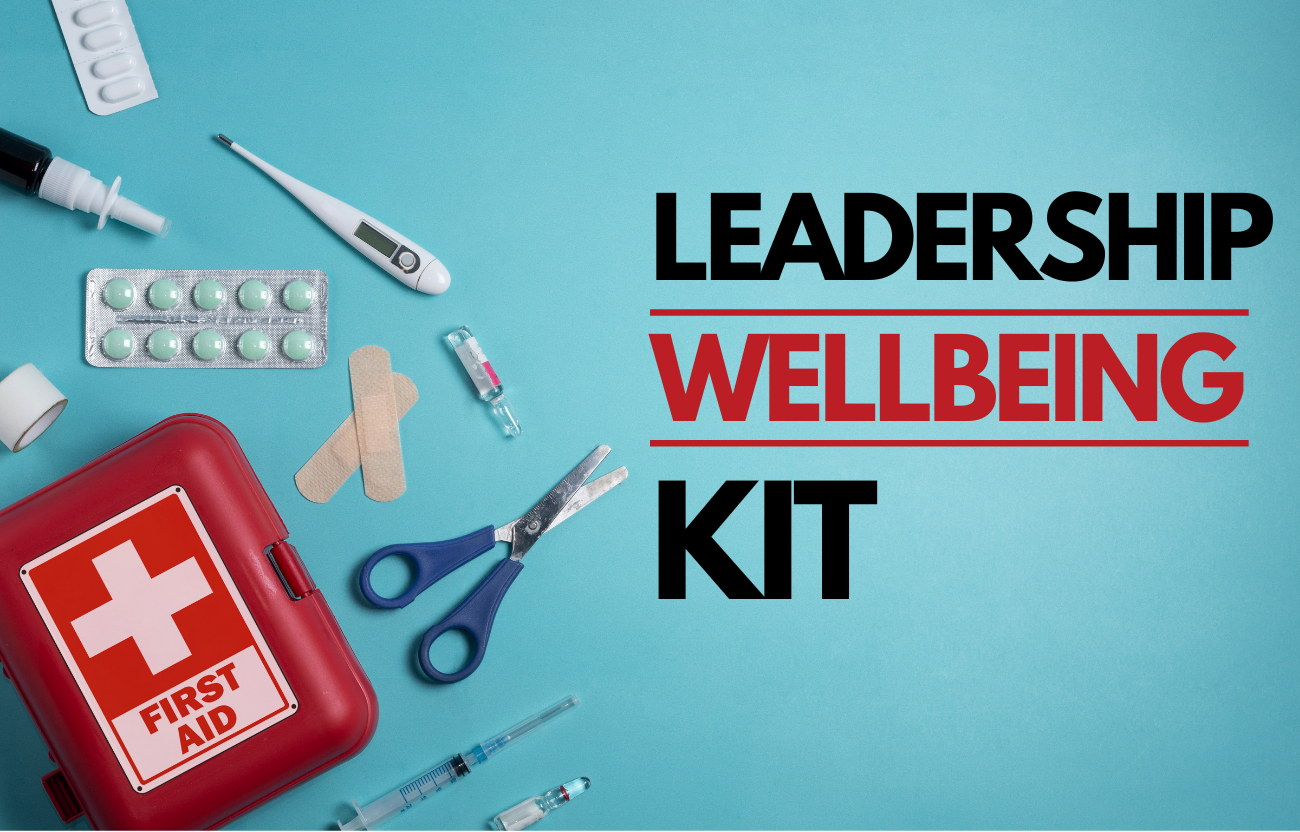With the responsibility of leadership comes the frequent need to be first responders within our organizations – navigating crises, supporting our teams, and driving towards goals, often under immense pressure. We diligently ensure our teams have the tools for their tasks, but how often do we equip ourselves for our own emotional well-being? This isn’t about sentimentality; it’s about recognizing that effective leadership is intrinsically linked to our emotional resilience. As we wrap up Mental Health Awareness Month this May, let’s move beyond awareness and focus on building a lasting foundation. Think of this as creating your personal “Leadership Wellbeing First Aid Kit” – a practical framework for navigating the emotional demands of leading with greater clarity and long-term sustainability.
This kit offers accessible tools (metaphorically) to address the inevitable emotional challenges we face, not just during the designated awareness month of May, but as an ongoing practice. When we are emotionally equipped, we can lead with greater clarity, empathy, and sustained effectiveness. Let’s explore the essential components of this vital kit:
The Essential Tools (For Ongoing Wellbeing):
🩹 “Minor Setback Strips”: For those daily frustrations, keep a few key questions handy to quickly regain perspective. Ask yourself: “What’s the key learning here?” or “What’s one small step forward I can take?”
💊 “Stress Relief Capsules”: For immediate moments of pressure, utilize quick, accessible stress-reduction techniques. Three deep breaths 🧘, a mindful pause, or a brief stretch can offer surprising relief. Make these habits, not just reactions.
🧤 “Empathy Buffer Pads”: During difficult conversations, employ active listening techniques. Remind yourself: “Am I truly hearing their perspective?” and “Am I acknowledging their feelings?” Cultivate this as a consistent leadership skill.
🔗 “Connection Binding Tape”: Maintain a readily accessible list of 2-3 trusted colleagues or mentors you can briefly connect with for a quick sounding board or reality check. Nurture these relationships consistently.
🧠 “Thought Extraction Tweezers”: Develop the skill to identify and challenge negative or unhelpful thought patterns. Ask yourself: “What evidence supports this thought?” and “What’s a more balanced perspective?” Practice this regularly.
✂️ “Boundary Cutting Tool”: Be intentional about setting and maintaining healthy boundaries with your workload and availability to protect your energy and focus. Regularly reassess and reinforce these boundaries.
🧊 “Calming Coolant Pack”: For moments of overwhelm, utilize a quick grounding technique to bring you back to the present. Focus on your senses or a simple, repetitive action. Integrate these into your routine.
🛡️ “Resilience Wrap”: Reconnect with your core leadership values and your “why.” This serves as an internal anchor during significant challenges, reminding you of your purpose and guiding principles – revisit this regularly.
🆘 “Crisis Response Guide (Emotional)”: Have readily available contact information for your organization’s EAP and key mental health resources. Familiarize yourself with basic steps for supporting a team member (or yourself) in emotional distress. Ensure this knowledge is current.
💧 “Clarity Drops”: Utilize brief journaling prompts for regular self-reflection. Ask yourself: “What’s my biggest takeaway from this week?” or “What emotions am I currently processing?” Make this a consistent practice.
🧤 “Empathy Shields”: While offering support, remember to maintain healthy emotional boundaries to avoid burnout. Recognize the difference between empathy and absorbing others’ distress – practice self-regulation.
📖 “Leadership Self-Care Manifesto”: Develop a concise personal reminder of why prioritizing your well-being is crucial for effective leadership and outline your non-negotiable self-care practices. Treat this as a living document.
🤝 “Delegation Support Sling”: Consciously identify opportunities to delegate effectively, empowering your team and alleviating your workload. Make delegation a strategic habit.
⚙️ “Adaptability Fasteners”: Cultivate flexibility and a growth mindset. Remind yourself that setbacks are learning opportunities and that adapting to change is a key leadership skill – practice embracing ambiguity.
Building your Leadership Wellbeing First Aid Kit is not just for Mental Health Awareness Month; it’s an ongoing practice for sustained effectiveness. Regularly reflect on what tools are most effective for you and adapt your kit as you grow. By prioritizing your emotional health year-round, you’re not just helping yourself – you’re setting a powerful example for your team and building a more resilient organization from the top down.

